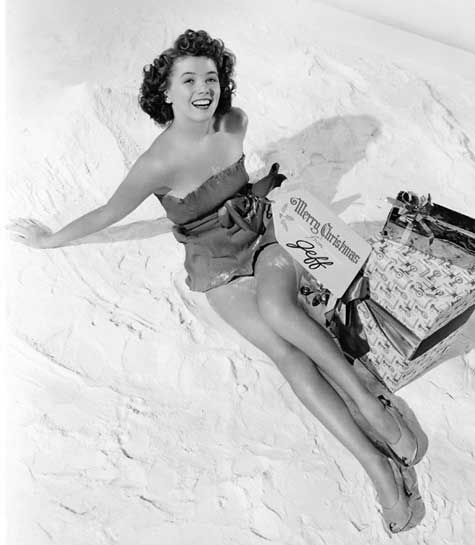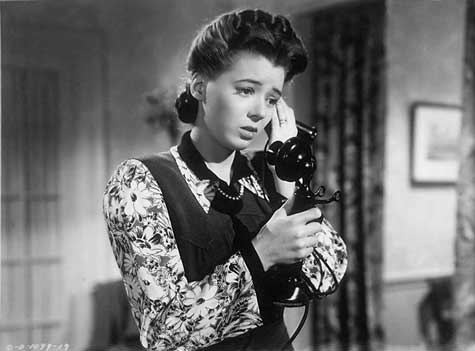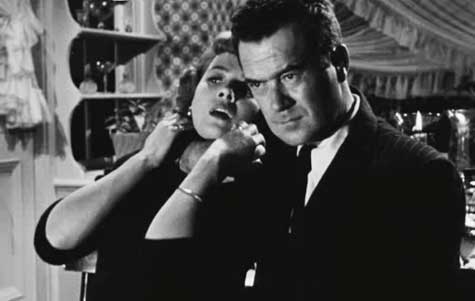
Jeff Donnell just seemed nice. Maybe that’s why she was the resident Nice Girl of film noir. She was always cast as the chipper best friend, or the perky wife, or the goofy roommate. No matter the role, she was almost always called upon to project a certain affability and intrinsic kindness. Maybe it came easy, or maybe she just made it look easy. Either way, in a genre of femme fatales she was la femme par excellence.
It must be said, though, that Donnell didn’t just bring big brown eyes and a shy smile to her roles. In her quiet way, she always seemed just a bit savvier than everyone around her. Her best known role was probably in the Nicholas Ray masterpiece In A Lonely Place (1950) where she played the wife of cop Frank Lovejoy. Of all the characters in the plot, she’s the one who most clearly sees that drunken screenwriter Humphrey Bogart is a violent, misogynist loon. In a film full of great performances, Donnell’s restrained turn can be overlooked. But go back and watch the film again and you’ll see the way her steady, all-seeing presence unnerves Bogart from the get-go. She was perfectly paired here with Lovejoy, who was the great Everyman of film noir. Maybe Donnell was noir’s great Everywoman.
Donnell hailed from Maine where her father was the superintendent of a reformatory for boys. She was born Jean Marie Donnell in 1921, but as a girl she adopted the nickname “Jeff” after the Mutt & Jeff comic strip. She caught the acting bug early and studied drama at the Leland Powers School in Boston and later enrolled in the Yale School of Drama. By 1942, she was in Hollywood under contract to Columbia Pictures, where her first appearances were billed as “Miss Jeff Donnell” to avoid any confusion.

Her first few years in the business were frustrating. Cast in bit parts, she often went uncredited or saw her parts end up on the editing room floor. The emerging genre of film noir, however, turned out to have a place for her. Her first noir was the underrated 1946 Night Editor, which stars William Gargan as a married cop who gets mixed up with a beautiful psycho played by Janis Carter. Donnell was cast as Gargan’s doe-eyed wife and has to watch in horror as her man is very nearly pulled down into hell by a sexy she-devil. It’s not a showy role by any means, but Donnell, as always, is imminently believable and likable.
Throughout the forties, she was a reliable performer for Columbia, which occasionally loaned her out to other studios like Republic for work on individual films. She did work on the Boston Blackie mystery series (The Phantom Thief) and put in her time in musicals (Carolina Blues), westerns (Outcasts Of The Trail), and even the odd musical western (Throw A Saddle On A Star).
In the fifties, she did more noir work. In 1950—the same year she helped smoke out Bogart in In A Lonely Place—she showed up briefly in Walk Softly, Stranger, co-starring alongside Joseph Cotton and Alida Valli. Donnell has a scene as Cotton’s jilted girlfriend and gets to display a little more fire than usual. In 1953, playing Anne Baxter’s spunky, mystery-reading roommate, she helped bring some comic relief to Fritz Lang’s dark and deadly The Blue Gardenia (written by Charles Hoffman from a story by Vera Caspary).

By this time, the roles had started to shrink and Donnell turned to television for work. She made appearances in early anthology shows like Schlitz Playhouse, Studio 57, and Playhouse 90.
Then in 1957, she got a juicy role as Tony Curtis’s tenderhearted secretary/girlfriend in Sweet Smell Of Success. She was excellent—conveying a sense of almost masochistic devotion to Curtis’s slimy bottom feeder—but much of her performance wound up being cut out of the film because director Alexander Mackendrick felt that her scenes made Curtis appear too sympathetic.
SEE ALSO: More mugs (and molls) in Noir's Goon Squad!
After her film career had cooled, she worked more and more in television, becoming one of those familiar faces who seemed to pop up on everything from Perry Mason to Love, American Style. She did some work on the live action series The Amazing Spider-Man, becoming the first actor to play Peter Parker’s Aunt Mae onscreen. She still made some move appearances in the sixties (she played Gidget’s mother in two movies), but by the seventies, she was almost exclusively on television. Her longest lasting role was in the eighties on General Hospital, playing a rich man’s housekeeper. When Donnell died suddenly in her sleep in 1988 at the age of 66, the soap opera wrote her off the show by having her character win the lottery and move away.
Donnell always stayed relatively positive about her place in Hollywood—a good mindset for any character actor. Not long before she died, she told an interviewer, “I wasn't the pretty type and I certainly wasn't glamorous, so I always felt fortunate to be acting. My first concern was for my family, so I never developed a driving ambition. I consider myself a very lucky person.”
Jake Hinkson is the author of several novels, including the newly-released The Big Ugly.

Nice profile of a memorable actress. According to her own words, Jeff didn’t consider herself pretty. I have to disagree!!